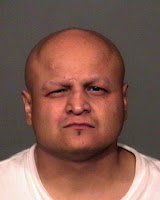Will the gun
restriction bill passed by the legislature have an appreciable impact on gun
crime in Connecticut? The future will provide an answer to that question, but
it does not seem likely.
The gun
restriction bill is targeted at gun owners that even Michael Lawlor, Governor Dannel
Malloy’s choice to reform penology in the state, would be forced to admit do
not generally show up in crime statistics. How many NRA members are currently
doing time in Connecticut prisons because they used their guns to hold up
EZMarts – like Frankie Resto?
Released
early from prison under the auspices of Mr. Lawlor’s Risk Reduction Earned
Credits program, Frankie Resto, a little more than a year ago, easily acquired
a gun and fatally shot a store owner in Meriden.
Unless you
can separate Frankie “The Razor” Resto and guns you will not make a dent in in the
use of weapons by criminals; incidentally, they’re called “criminals” because
they commit crimes.
The
distinction between law abiding gun owners and violent criminals seems to be
lost on the Malloy administration, Mr. Lawlor and the Democratic dominated General
Assembly. Mr. Resto was a gangbanger who never -- under any circumstances -- should have been let out early from prison. In fact, after he had engaged in
drug activity and burned his mattress while in prison, additional years should
have been ADDED to his sentence.
Recently,
three young men shot and killed a jogger, Chris Lane, a promising athlete from
Australia , because, the shooters said, they were bored and decided to kill
someone. But the person whose phone call
to the police was instrumental in their arrest, James Johnson, insists that the
crime was a gang initiation killing. In criminal infested urban ghettos, where
fathers are as rare as jobs, random or gang related killings are not at all
surprising.
Mr. Johnson
told an Australian paper, the Sydney Morning Herald,
that the shooters “don't have proper fathers in their lives. You can't be a
friend to your son; you got to be the father… I feel very sorry for them, they
have ruined their whole lives, but they did the crime, they have to do the
time. Perhaps they can make a life inside, get God in their lives.”
In many
urban environments, random killings by gang members are part of the day’s
routine. One may confidently hazard a guess that none of the young men accused
of shooting Mr. Lane were members of the NRA. Every prison administrator and
guard who had come into contact with Mr. Resto knew he was a gang member with a
violent record.
When Mr.
Malloy, Mr. Lawlor and the General Assembly have finished passing bills
restricting the use of guns by non-violent gun owners and facilitating the
early release of violent convicted criminals, they might want to do something
about urban gangs. In large cities in
Connecticut, guns don’t kill people – gangs do. The gun restriction bill passed in Connecticut
may or may not be useful, but the long arm of that bill will not inconvenience
the criminal element in cities.
What could
be done to accomplish this end? All the effective solutions are politically
risky. It would help a great deal if politicians were interested in restoring
the torn social fabric in urban areas.
We should
not wait for universal agreement among sociologists before we accept as reasonable
Mr. Johnson’s proposition that young boys go wrong when they are not guided by
a father’s firm hand. In fact, there are
many sociological studies that point to a connection between fatherless
families and urban crime; other studies demonstrate a positive connection between
the presence of a father in an urban family and intelligence in male children.
Fatherless children
in urban areas drift off into gangs, often a paternalistic substitute, commit
crimes, go to prison, get out, commit more crimes, father a fatherless child,
go back to prison – and the unbroken cycle repeats itself endlessly. We have to wake up to this reality. How many more young boys in cities have to be
sacrificed to the urban Moloch before we take very hard, politically risky
steps to ameliorate the problem?
Moloch was
the pagan idol to which children were sacrificed by a passage through fire. We
have to restore – especially in urban environments, where children are made to
pass through the fire daily – the real presence of fathers in families. And
moral suasion is not enough. It is not
enough for a paternalistic state to tell an absent father who effectively has been
replaced by the solicitous state, that he must – really, he must! – accept the responsibilities
of fatherhood, even from his jail cell.
Either we
take the hard way or we accept Moloch’s terms: A child, abandoned by its father, is born out
of wedlock; the state agrees to finance the status quo; the child joins a gang,
passes through the fire, commits a crime, goes to prison, is let out early
because he has taken courses provided by Mr. Lawlor’s new program, fathers yet another
out of wedlock child, commits another crime, is remanded to prison. And the prisoner’s
children are remanded to Moloch.
Under these
circumstances, every refusal of a choice is a choice.

Comments